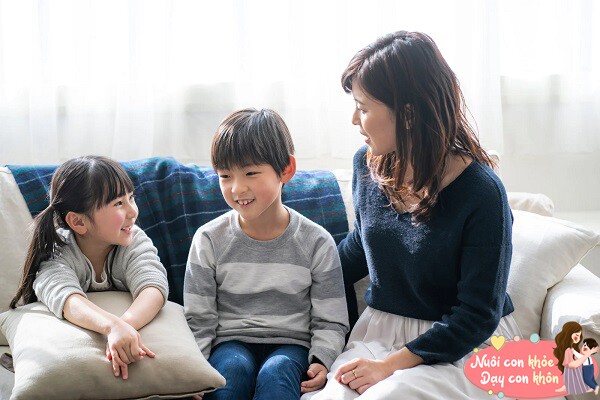What’s special is that the child’s prefrontal cortex is fully developed, resulting in better emotional management.
Therefore, if parents can spend more time with their children, their brains will become smarter, their emotional intelligence will increase, and they will have more prospects in the future. In particular, if parents activate the brain in the following ways.


“A high-energy good morning”: Activating children’s energy
Psychologists have discovered that the type of language children receive in the morning directly affects 70% of their emotional state and behavior throughout the day.
For example, if parents say, “You must pay attention in class”, the child may feel that their parents doubt their ability to focus. Or, “Hurry up, don’t dawdle” may create a sense of discouragement in the child’s brain.
Brain science reveals that a child’s brain is most active between 6 and 8 am. Information received during this time goes straight to the subconscious and becomes the guide for the child’s behavior throughout the day.
At this stage, parents should perform a “Morning Energy Ritual” to help children maintain a positive energy level throughout the day.
For instance, saying “Good morning, dear” more often can activate the brain and energize children for the day.

Image source: Pinterest.
Give children choices
Experts chose two groups of students and asked them to complete the same task. Group A was instructed to “Complete the task”, while Group B was asked, “How would you like to complete the task?”.
The result? Group B performed 40% better and came up with more creative solutions.
In reality, control leads to confrontation, while choice leads to responsibility.
Giving children a “self-management” role instills a sense of control and encourages brain vitality.
Loving care
“Don’t stress too much about schoolwork. If you’re not happy, please talk to me!”
The purpose of these words is to build a sense of security and love in the child.
Words of expectation
“Look, you’re more active today than yesterday. I believe you’ll keep getting better!”
By conveying these positive psychological hints, the child’s brain will release dopamine, leading to improved focus and positivity.
Morning is not a battlefield but an energy-charging station. Every word and action of the parents are writing the script of the child’s life.

Family meeting for an hour every week: Building children’s leadership skills
A report from the Journal of Neuroscience found that when children participate in family decision-making, blood flow to the prefrontal cortex (responsible for planning and accountability) increases by 37%. This means that the earlier children become “responsible,” the easier it is to nurture rational thinking.
How can children become the family’s pillar earlier?
Mr. Tran from Hangzhou shared his experience of holding family meetings for 30 minutes every week since his son turned five.
He lets his children vote on dinner menus. Starting at age nine, they lead discussions about summer vacation expenses. After age 13, the family analyzes red envelope investment plans together…
His 22-year-old son has founded two companies while still in college.
In reality, children who participate in family decision-making from an early age will be better at coordinating resources and solving problems when they grow up.
Therefore, each family should hold a “family meeting” to involve children in organizing and planning, fostering leadership skills in all aspects.

Building children’s leadership skills.
For example, discuss where to go on the weekend and how to distribute chores, teaching children to consider the needs of multiple parties and find their sense of responsibility.
Or, discuss what each person does well and what can be improved, summarizing mistakes and providing suggestions for improvement, helping children become better versions of themselves.
Giving children leadership opportunities improves their thinking, perspective, courage, decision-making, and problem-solving skills. This is a stepping stone for children to assert themselves in society later on.

“Weekly Starry Sky Wish Jar”: Encouraging children’s progress
Professor Peng Kaiping of Tsinghua University conducted a survey of 300,000 elementary and middle school students. The results revealed the “four nos” phenomenon:
– No motivation to study.
– No interest in the real world.
– Social helplessness.
– Meaninglessness of life…
The cause was attributed to parenting styles, with many parents continuously conveying to their children: Study hard, get high scores, and get into a top university.
As a result, many parents suppress their children’s hobbies, interests, and ideals, demanding that they develop according to the parents’ plan. Over time, children give up their personal desires and needs.

Encouraging children’s progress.
The expert’s advice is for parents to nurture a sense of life purpose in children from an early age. To encourage this, use the “Weekly Starry Sky Wish Jar” method with your children each month.
Children will write down three wishes and goals and put them in an empty jar. During the month, they should work towards these goals, and if they achieve them, parents will grant one wish.
For example, the child’s wishes may include going on a trip, watching a movie, or playing soccer…
Goals could be: Improve five ranks in the exam…
Learn to ride a bike in a month…
This way, the sense of monthly accomplishment keeps children energized.

“Daily Intimate Time”: Fostering a close parent-child relationship
“Have you finished your homework? If not, hurry up and do it.”
“What did your teacher teach today?”
“It’s so cold; why are you wearing so little? You should wear this instead!”
This communication style, filled with commands and arrangements, activates the child’s defense mechanism. The child starts with “Yes, it’s fine” and then “Mom, can you stop talking?”
A Harvard University study found that children in families who spent 10 minutes a day chatting together had a 40% lower rate of depression.
So, how should parents talk to their children? Establish a “daily intimate time.”

Prepare a dark space: This will help children express themselves more easily.
For example, turn off the lights before bedtime or gaze at the night sky while camping outdoors.
When chatting with children, avoid discussing schoolwork and focus on emotions:
“If you could be an animal, what would you be?”
“Mom senses that you haven’t been happy lately.”
“What has made you happiest recently?”
Casual conversations help children lower their guard and express their true emotions. By communicating with an open heart, parents and children develop a closer bond.

Family Awards Night: Boosting children’s self-confidence
I read on the Internet about a homeroom teacher who assigned parents a task during the winter vacation: receive an award from your child.
The teacher provided some suggestions:
· If there is a breakthrough in some aspects, they can be awarded the “Creative Award”
· Learning a new skill can earn the “Small Learning Expert Award”
· Becoming more independent and responsible in life can lead to the “Progress Star Award.”
The teacher added: Children need recognition and respect to develop a positive attitude towards life.
As parents, we talk to our children about studying all day, and sometimes we even have to urge, beat, or scold them.
In reality, there is very little affirmation from parents.
Children need encouragement and praise. Every time you compliment your child, you plant more positive expectations in their hearts.

Boosting children’s self-confidence.
A netizen shared the story of her daughter:
My daughter’s grades were not ideal before, and she was often criticized. Sometimes she was not acknowledged even when she did well, so she became anxious and had low self-esteem.
It wasn’t until we saw the “Family Awards Night” online that we realized: affirmation and encouragement can awaken children’s sense of respect and inner motivation.
So, we also held a “Family Awards Night.”
Held once a month.
I drew “portraits” of each family member, designed 11 awards, including the Outstanding Contribution Award and the Most Improved Award, and wrote hundreds of words of introduction for each award.
This way, my daughter’s grades improved without her even realizing it.
Positive psychology research shows that:
Children who receive the “Best Comforter Award” have empathy scores 2.8 times higher than other children;
Making trophies out of clay and prolonging the feeling of honor for 6 months and 17 days.
Only with regular self-esteem can we create wonderful children.

Five-minute hugs every day: Unlocking the code of emotions
A survey by Beijing Normal University found that children who receive daily hugs have a 57% lower risk of depression.
Why is hugging so powerful?
Anthropologist Ashley Montagu points out that the skin is the greatest social organ. When hugged, skin-to-skin contact activates the prefrontal cortex, causing the person being touched to:
– Feel safe.
– Have richer emotions and trust their parents more.
“4 Behaviors That Indicate Overly ‘Innocent’ Parenting: Protect Your Child From Bullying”
A child who is overly meek may become a target for bullies. It is important for parents to recognize the signs of an overly submissive personality and take steps to empower their child. This may include encouraging them to stand up for themselves, teaching them assertiveness skills, and boosting their self-esteem. By helping their child develop a healthier sense of self-worth, parents can reduce the risk of them becoming a victim of bullying.
“5 Powerful Phrases Parents Can Use to Instill a Sense of Royalty in Their Children”
Nurturing a child’s inner strength and resilience is paramount, and parental guidance plays a pivotal role in this regard. Words from parents can empower children with a robust sense of self, positive behavior, and a confident demeanor, equipping them with the tools to navigate and protect themselves in an ever-changing world.




































